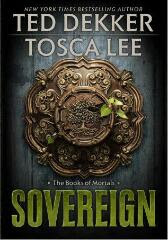It’s been fifteen years since Rom Sebastien learned the truth that everybody in the world was dead, stripped of all emotion but fear. Six years ago, Jonathan, the boy the ones who were awakened to emotion and known as Mortals believed would bring life to the world through his blood and become the true Sovereign, was killed at the hands of Saric, the leader of the deadly Dark Bloods. Rom, Jordin, and a few other Mortals believed they were meant to take Jonathan’s dead blood and bring love and life to the world. They began calling themselves Sovereigns. Though they were once many, they have been hunted and many of their number killed by Dark Bloods and the ones once aligned with Jonathan while he was alive, now known as Immortals. The Dark Bloods and Immortals are both more powerful than the Sovereigns. Roland and his band of Immortals want to rid the world of Sovereigns and Dark Bloods and rule Byzantium as the superior race. The Sovereigns are on the brink of extinction. One of their own has released a virus that will kill Dark Bloods and Immortals alike, leaving the world with only Corpses and the remaining Sovereigns. The virus, like the virus that stripped the world of its emotions generations earlier, will return the world to one void of life. Rom knows this isn’t the way Jonathan would have wanted. He goes to Feyn, the now ruthless leader of the Dark Bloods, to foolishly plead for her surrender to Sovereign blood, which Jordin goes to the Immortals to one as one of their own to find a way to preserve Sovereign blood. As the Dark Bloods and the Immortals, combined with the deadly virus, close in, the Sovereign blood, and the life and genuine love it is supposed to bring, is in danger of becoming permanently extinct.
SOVEREIGN is the conclusion to The Books of Mortals trilogy by Ted Dekker and Tosca Lee. The Books of Mortals is an allegory of the redemptive history told in the Bible, and it brings much that humanity wrestles with to the forefront of your thoughts and emotions as you’re reading. Trilogies are always my favorite types of stories, and the third book in a trilogy is always almost always an incredibly intense ride to the finish. SOVEREIGN is no exception. The stakes have never been higher. No one is safe, and Dekker and Lee make it clear that by the end of this book, either the world will be alive again or death will finally reign permanently supreme. And there were certainly moments in the story that I wasn’t sure how this could end up okay in the end, or even what okay was going to look like. Ted Dekker has a way of painting a situation as hopelessly impossible as can be, and this ability to create heart pounding suspense has always been one of my favorite parts of his writing.
In the first two books of the series, the main protagonist of the story was Rom Sebastien. In SOVEREIGN Jordin steps into that role. Rom is, of course, in the novel, but not as much as you would expect given his role in the story. In fact, there are no scenes told from Rom’s point-of-view. While I thought the story was good and it kept me interested all along, I wished that Rom’s point-of-view hadn’t been taken out. However, the way the story progresses, it does make sense why we wouldn’t see into Rom’s inner world, so I can understand why Dekker and Lee might have done it.
Jordin’s journey is one that feels tragic most of the time. She loved Jonathan, but Jonathan is gone, and though she wants to believe that he lives on beyond death, she feels alone. Being Sovereign doesn’t seem like she would have thought. Or like any of the Sovereigns would have thought. This is one of the themes that resonates throughout the story: who is it that is truly alive? Can you tell from outer appearances who is really alive? Does being alive mean being well off in life?
The Sovereigns are greatly misunderstood in what they are trying to do. More than that, Jonathan’s desires are greatly misunderstood even by the Sovereigns. What is the life that Jonathan came to bring? What does it look like? Would it meet their natural expectations? As the story moves along, nothing is what it seems. Dekker and Lee introduced a story in which we came to believe that the solution to the story problem was life and a restoration of emotions, but, much like God did through the Bible, they reveal to us that the story solution isn’t what we think. It’s much more, and it doesn’t look like we expect.
As an allegory SOVEREIGN perfectly captures the struggle that Christians and non-Christians alike have with what it means to truly be alive. Jesus was greatly misunderstood, just as Jonathan was in this story. And at times it feels like we’re utterly alone and that Jesus isn’t there, much like the Sovereigns felt in the story. It’s in this story that Dekker and Lee show us what it means to truly love and trust Jesus and what being alive truly looks like.
I loved SOVEREIGN and hated to see it end, but I felt like I had learned something incredibly important through its story. The Books of Mortals series was a brilliant recasting of redemptive history that will stay with me for a long time.
Review copy provided by FaithWords
Photo Credit: FaithWords











